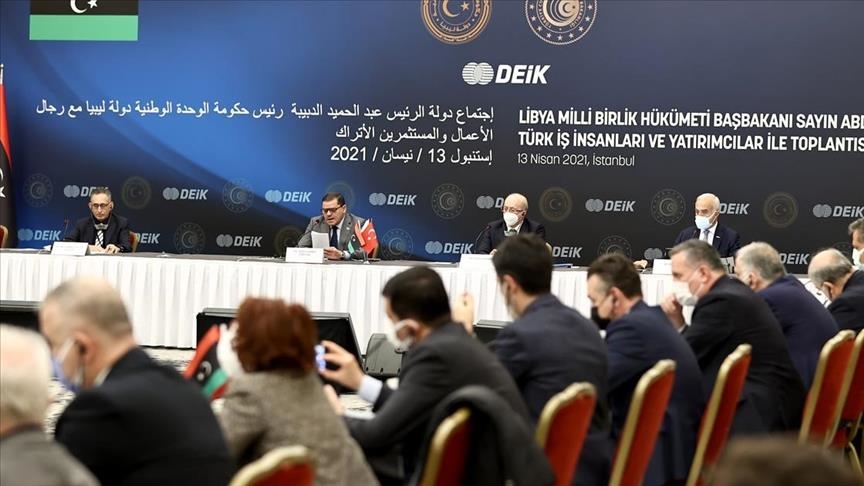

By Anadolu Agency
ANKARA, TURKEY
Turkish businesses will tackle new projects in the energy, healthcare, and construction sectors in Libya as promised during the prime minister’s visit to the Turkish capital Ankara this week, according to the head of Turkey’s Foreign Economic Relations Board (DEIK).
Turkish companies will take up projects not only to build power plants but also electricity distribution in Libya, Nail Olpak told Anadolu Agency following Libyan Prime Minister Abdul Hamid Dbeibeh’s two-day official visit to the capital Ankara.
Libya has gone through a rocky decade, Olpak said in an exclusive interview, but added that the current peace process is a promising one.
“The fact that the prime minister came with a very large delegation is a sign of the value given to relations with Turkey,” Olpak stressed.
Turkish businesses also welcomed Dbeibeh’s remarks following meetings with Turkey’s president and other top officials on Monday, as he touted boosting ties with Turkey to make them a “model of what the relationship with Libya should be.”
Commenting on the outcome of Tuesday’s Turkey-Libya hybrid roundtable meeting, Olpak said the prime minister’s approach was pragmatic as “he’s also from the business world.”
“Dbeibeh answered all the questions from the businesspeople and dealt with their problems one by one,” he said.
The meeting also covered opening a Libyan Embassy in the capital Ankara and a Turkish Consulate in Benghazi, northeastern Libya, as well as enabling visa-free visits for Turkish nationals and signing a free trade pact between the two countries, said Olpak.
“The prime minister wants to take prompt action on these issues,” he stressed.
‘Libya prefers working with Turkish businesspeople’
As some projects by Turkish firms were interrupted during the disorder in Libya, especially construction projects, Olpak said the Libyan government is ready to help their completion and encourage new ones.
“Libya prefers to work with Turkish businesspeople for its critical new projects, as it has good experience with us,” he stressed.
A similar Turkish-Libyan meeting, on a sectoral basis, will be held in Libya in May after Eid al-Fitr, marking the end of the Muslim holy month of Ramadan, said Olpak.
Highlighting that last year the trade volume between the two countries topped $3 billion, Olpak said investments in Libya should be considered not only in construction but also in the energy sector.
“Libya has an energy shortage. This was one of the important topics discussed during the roundtable meeting,” he said, adding that the country has serious oil-related needs, including refineries that Turkish businesses should invest in.
“Let’s not see the underground resources not on the agenda in Libya as oil alone,” Olpak underlined.
Warm support reaps rewards
Noting that the Turkish business world sees the rewards of its support and warm approach towards Libya, Olpak said there are more deals coming soon, besides five agreements signed in Ankara on Monday to boost cooperation in the field of media, construction, and power plants.
“Not only power plant construction but also electricity distribution is on our agenda, as Libya is having problems with this,” Olpak explained.
He highlighted that the meeting also addressed cooperation in the healthcare sector, saying: “Libya’s health minister will continue negotiations with Turkish companies for both hospital construction and management.”
Olpak added that the two sides wrapped up their meeting with “very positive feelings.”
On Monday, after talks with high-level Libyan officials, Turkish leaders stressed continued bilateral cooperation, as well as the return of Turkish businesses to Libya as the country, regains stability.
Libya fell into chaos and civil war following the 2011 ouster of strongman Muammar Gaddafi.
Turkey has long supported the efforts of the Government of National Unity to bring the country together.
On Feb. 5, Libyan delegates elected Dbeibeh the country’s new prime minister and Mohammad Menfi to head a three-member Presidential Council.
Elections in the North African country are set for Dec. 24.
We use cookies on our website to give you a better experience, improve performance, and for analytics. For more information, please see our Cookie Policy By clicking “Accept” you agree to our use of cookies.
Read More